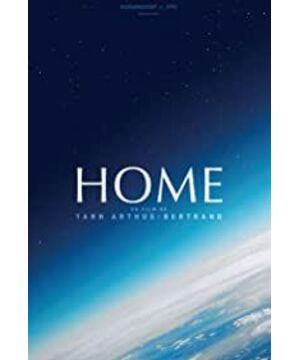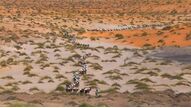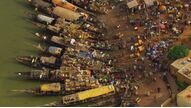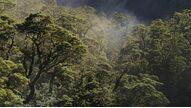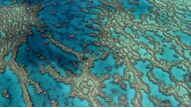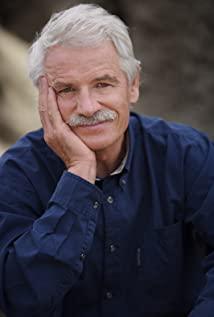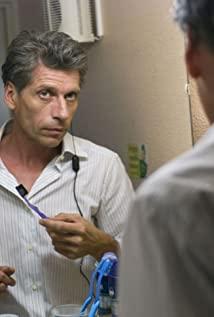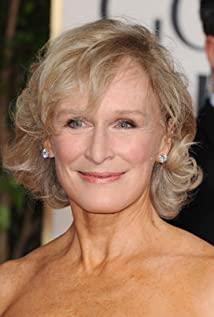Humans have only ten years to reverse the warming trend
lest human trespassers enter the unknown and live a life like never before
We concoct phenomena that we have no control over
Since our origins, water, air, and life forms have all been closely linked
But in recent years, those bonds have been broken
Let's face it, we have to trust our knowledge
Everything we've just seen is a reflection of human behavior
We have changed the earth in our imagination
We have very little time to make changes
How does this century carry the burden of nine billion people?
If we refuse to take responsibility for what we do
20% of the world's population consumes 80% of resources
Global annual military spending is 12 times more than developing countries' aid
5,000 people die every day from drinking water pollution, 1 billion people do not have access to safe drinking water
Nearly 1 billion people face famine
50% of global food trade is used to feed or make biofuels
40% of arable farmland has suffered long-term damage
13 million hectares of forest are lost every year
One in four mammals, one in eight birds, and one in three amphibians face extinction
Species die 1,000 times faster than their natural reproduction rate
Three-quarters of fisheries are depleted, abandoned or at risk of declining production
Average temperatures over the past 15 years are the warmest on record
Ice sheets are 40% thinner than they were 40 years ago
200 million people could become climate refugees by 2050
Our actions are costly
Others who are not actively involved also pay the price
I've seen refugee camps that stretch across the desert, big like a city
How many men, women and children will be displaced again tomorrow?
We must build walls to destroy human unity
Separating races, preserving the well-being of some and the lives of others?
It's too late to be pessimistic
I know one man can push all the walls
It's too late to be pessimistic
Worldwide, 4 out of 5 children are in school
Never before have so many people been educated
Everyone can contribute, rich or poor
Lesotho is one of the poorest countries in the world
They spend the highest proportion of national education funding
Qatar is one of the richest countries in the world
They bring in the best universities
Culture, education, research, innovation are inexhaustible resources
face misery and pain
Millions of NGOs prove solidarity between people
Stronger than the selfishness of nations
In Bangladesh, some people are whimsical
Want to open a bank to lend only to the poor
Over 30 years, the lives of 150 million people around the world have improved
Antarctica is rich in natural resources
they don't belong to any country
Its natural reserves are for peaceful and scientific purposes only
An agreement signed by 49 nations to make it a treasure trove shared by mankind
It's too late to be pessimistic
Multinational governments have taken action to protect 2% of the earth's water sources
Although not much, it is twice as much as ten years ago
The first natural parks were established a century ago
13% of the continent's area
They create spaces where humans can protect species, soils and landscapes
The harmony between man and nature becomes the law
instead of accident
In the US, New York City has understood the good intentions of nature
These forests and lakes provide drinking water for the city
In South Korea, forests are damaged by war
Credit to a global afforestation program
Global forest cover reaches 65% again
75% of paper can be recycled
Costa Rica chooses between military spending and land protection
This country no longer has an army
It would rather devote resources to education, ecotourism and protection of virgin forests
Gabon is the world's largest timber producer
it enforces selective logging
Only one tree can be cut per hectare
Its forests are the country's most important economic source
But they now have enough time to regenerate
Plans now in place to ensure sustainable forest management
but must be enforced
either consumer or producer
must fight for fairness
Fair trade benefits both buyers and sellers
That way everyone can succeed and live comfortably
Some people use their hands as tools
Others have farm machinery and state subsidies
How can justice and equality come about?
Let's be responsible consumers and think about what we buy?
It's too late to be pessimistic
I have seen agriculture within the reach of man
Produce could feed all humans if meat makers don't take human rations
I have seen some fishermen who fish carefully and care about ocean treasures
I've seen houses that generate their own energy
Five thousand people live in the first eco-friendly zone on earth
it is located in freiburg, germany
Many cities become partners
Mumbai will be the thousandth
Governments of New Zealand, Iceland, Austria, Sweden, etc.
Decided to make renewable energy development a top priority
I know that 80% of the energy on earth comes from fossil energy
In China alone, two thermal power plants are built every week
But I also saw a prototype of a thermal power plant in Denmark
it sends the released carbon to the ground instead of to the sky
Is this a future solution? No one knows yet
I have seen power plants using geothermal resources in Iceland
I have seen "moray eels" lying in the sea, using the energy of the waves to generate electricity
I've seen wind farms off the coast of Denmark
It can produce 20% of the country's electricity
The US, China, India, Germany and Spain are the largest investors in renewable energy
They have provided 2.5 million jobs
Where on earth would there be no wind?
I've seen vast deserts scorching under the sun
Everything on Earth is interconnected
And the earth is related to its source of energy, the sun
Can humans capture the energy of the sun like plants do?
The energy that the sun throws on the earth every hour is equivalent to the consumption of all human beings in a year
As long as the earth exists, the energy of the sun will be inexhaustible
All we have to do is stop drilling the earth and look to the sky
We have to learn to cultivate the sun
These experiments are just examples, but show new insights
They are based on moderation, wisdom, sharing
Laying the foundation stone for a new human adventure
It's time to unite
It's not what's gone that matters, it's what we have now
We still have half the world's woods
Thousands of rivers, lakes and glaciers
and thousands of biological species
We know what's the solution
We all have the power to change the world
So what are we waiting for?
It's up to you to write what happens next
Together
View more about Home reviews


